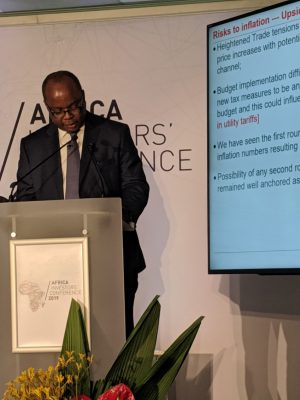THE FUND
The fund fell 1.9% in June, worse than the benchmark index MSCI EFM Africa ex South Africa Net Total Return Index, which fell 0.3%. So far this year, the fund has risen by 6.5%, underperforming the benchmark index, which has risen 11.6%.
At country level, the underweights in Kenya (0% of fund assets) and Senegal (0%) contributed most positively relative to the benchmark in June. The fund’s underweight in Morocco (0% of fund assets) and overweight in Egypt (51%) contributed most negatively. At the sector level, the underweight in Communication Services and Energy contributed most positively, while underweights in Materials and Consumers Staples contributed most negatively relative to the index in June. The Swedish krona strengthened by 2.6% against USD, which had a negative effect on the return converted to SEK.
If we compile the return since the beginning of the year, contributions from our Egyptian holdings have been satisfactory, while our Nigerian banks have not delivered as expected. The biggest explanation for the underperformance is the underweight in Kenya and Morocco.
No major portfolio changes were implemented during the month of June. (all changes in SEK).
MARKET
The African markets (MSCI EFM Africa xSA Net TR (SEK) -0.3%) traded in line with the other Frontier markets (MSCI FMxGCC Net TR (SEK), which also declined 0.3% in June. The best African stock market in the first half of 2019 was Zimbabwe + (45.4%) followed by Egypt (+ 17.1%), while Ghana (-10.4%) and Zambia (-7.7%) were the worst performers. (all changes in SEK).
Recently we attended a conference in London and met government officials and companies from eight different African countries and updated us on the operational environment for the companies and the countries in which they operate (which add up to over 20 countries). Despite widely differing conditions and industries, everyone breathes a lot of optimism and it is interesting to hear where they see the greatest potential and where the challenges are.
Inflation in Egypt (Hermes Index -0.2% in June) increased in line with expectations for the month of May, + 14.1%, an increase from April’s 13%. Economist expects inflation to rise in July as well due to reduced subsidies for, among other things, electricity. The inflation rate is expected to fall back late in the third quarter, which enables the Egyptian central bank to continue lowering the interest rates. The subsidies for gasoline and other fuel products are also expected to be reduced, in the budget the item has been reduced by over 40% to EGP SEK 53bn (USD 3.2bn) from EGP SEK 90bn (USD 5.4bn).
The positive sentiment from last month in Nigeria (Nigeria Stock Exchange Main Index -3.3%) did unfortunately not last, and the market fell, partly driven by profit taking in newly listed MTN. President Buhari forecasts that the economy will grow by 2.7% this year, compared to the IMF’s + 2.1% forecast, a clear improvement from 2018 when the economy grew by 1.9%. Stable oil prices and recently agreed extension of production cuts by OPEC will help them achieve that.
Kenya’s (Nairobi All Share Index -3.2%) inflation rose more than expected, + 5.7% versus expected 5.4% and the GDP growth for the first quarter was 5.6%, slightly worse than expectations mainly due to delayed rains impacting the harvest in the agriculture sector.
DISCLAIMER: Capital invested in a fund may either increase or decrease in value and it is not certain that you will be able to recover all of your investment. Historical return is no guarantee of future return. The Full Prospectus, KIID etc. are available on our homepage. You can also contact us to receive the documents free of charge. Please contact us if you require any further information: +46 8-5511 4570.


